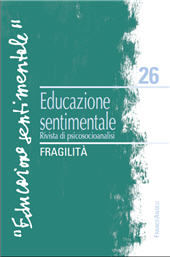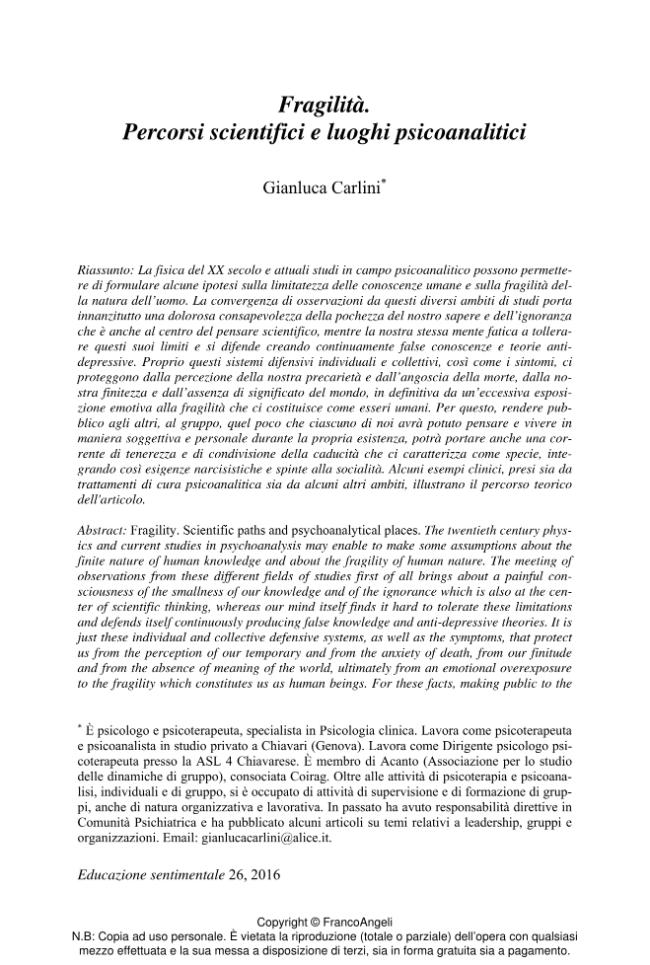Fragilità : percorsi scientifici e luoghi psicoanalitici
115-132 p.
La fisica del XX secolo e attuali studi in campo psicoanalitico possono permettere di formulare alcune ipotesi sulla limitatezza delle conoscenze umane e sulla fragilità della natura dell'uomo. La convergenza di osservazioni da questi diversi ambiti di studi porta innanzitutto una dolorosa consapevolezza della pochezza del nostro sapere e dell'ignoranza che è anche al centro del pensare scientifico, mentre la nostra stessa mente fatica a tollerare questi suoi limiti e si difende creando continuamente false conoscenze e teorie anti-depressive. Proprio questi sistemi difensivi individuali e collettivi, così come i sintomi, ci proteggono dalla percezione della nostra precarietà e dall'angoscia della morte, dalla nostra finitezza e dall'assenza di significato del mondo, in definitiva da un'eccessiva esposizione emotiva alla fragilità che ci costituisce come esseri umani. Per questo, rendere pubblico agli altri, al gruppo, quel poco che ciascuno di noi avrà potuto pensare e vivere in maniera soggettiva e personale
durante la propria esistenza, potrà portare anche una corrente di tenerezza e di condivisione della caducità che ci caratterizza come specie, integrando così esigenze narcisistiche e spinte alla socialità. Alcuni esempi clinici, presi sia da trattamenti di cura psicoanalitica sia da alcuni altri ambiti, illustrano il percorso teorico dell'articolo. [Testo dell'editore].
Fragility. Scientific paths and psychoanalytical places. The twentieth century physics and current studies in psychoanalysis may enable to make some assumptions about the finite nature of human knowledge and about the fragility of human nature. The meeting of observations from these different fields of studies first of all brings about a painful consciousness of the smallness of our knowledge and of the ignorance which is also at the center of scientific thinking, whereas our mind itself finds it hard to tolerate these limitations and defends itself continuously producing false knowledge and anti-depressive theories. It is just these individual and collective defensive systems, as well as the symptoms, that protect us from the perception of our temporary and from the anxiety of death, from our finitude and from the absence of meaning of the world, ultimately from an emotional overexposure to the fragility which constitutes us as human beings. For these facts, making public to the others, to the group, the lit
tle that each of us will have thought and lived in a subjective and personal way during his life, will also bring a current of tenderness and of sharing the caducity which characterizes us as a species, thus integrating narcissistic needs and pressures to sociality. Some clinical examples, taken from both psychoanalytic cure treatments and some different settings, illustrate the theoretical path of this article. [Publisher's Text].
Forma parte de
Educazione sentimentale : 26, 2, 2016-
Artículos del mismo número (disponibles individualmente)
-
Información
Código DOI: 10.3280/EDS2016-026006
ISSN: 2037-7649
MATERIAS
KEYWORDS
- Fisica, psicoanalisi, limiti della conoscenza, fragilità della natura umana, sublimazione, condivisione, rendere pubblico
- Physics, psychoanalysis, limits of knowledge, fragility of human nature, sublimation, sharing, making public



